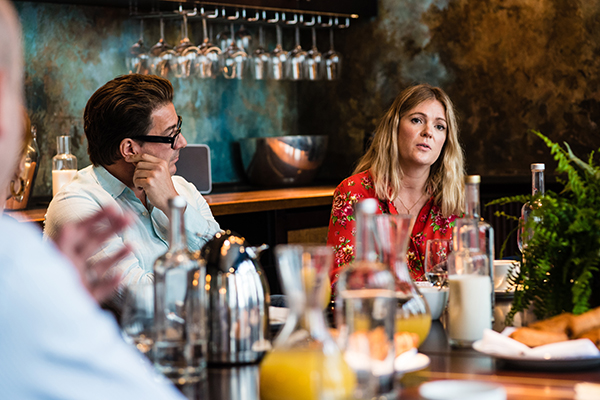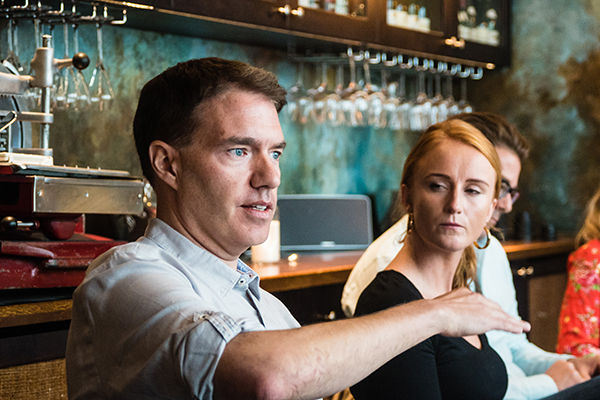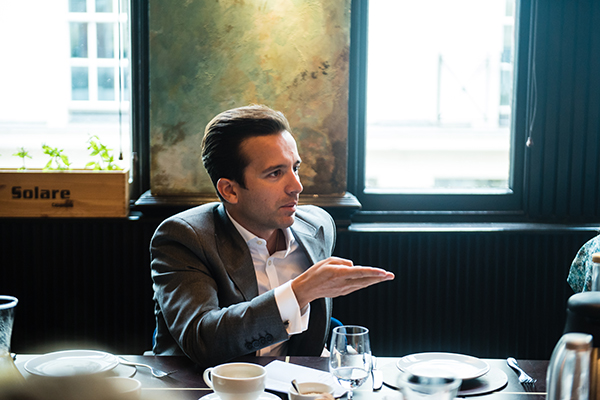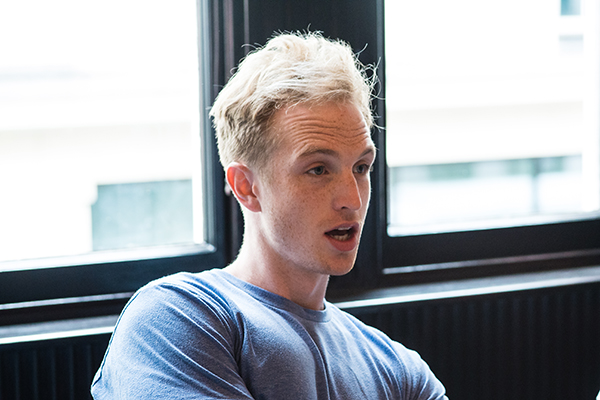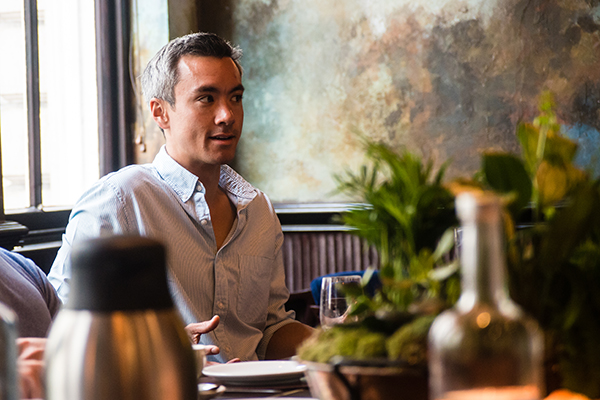Smart serve: a roundtable on tech in hospitality
Although its use in hospitality is lagging behind most industries, technology is undoubtedly changing the way restaurants operate. The Caterer gathered a panel of restaurateurs at London's Cabotte to share the challenges and benefits. Rosalind Mullen reports
How important is the role of technology in restaurants?
Stephen Tozer (ST): Different software is crucial to businesses in different ways. When we launched our first restaurant, it was all about the customer experience and service, which is affected by the reservations platform and EPoS system.
The other "piece" is back-of-house technology, which can impact on a commercial level. This was not as crucial when we had one restaurant, but we are about to open our second site in Covent Garden and, as we become a small group, it might be more salient. We are now looking at software solutions for stock management, rota management and so on.
Technology will expand beyond that in future, so you need to keep thinking about it. You have to adapt or die. But technology hasn't changed our industry as much as others.
Sam, how has the technology side changed since you opened your first restaurant, Sam's Brasserie in 2005?
Sam Harrison (SH): The restaurants I trained in were based on pen and paper with a diary for reservations, though when I opened my first two restaurants technology was starting to come to the fore. I sold them both in 2015 and am now opening a new site near Hammersmith Bridge, which I am super-excited about. I think technology will make my business more efficient and leaner. Even just three years ago you couldn't integrate your EPoS and reservations system.
I think screens in the kitchen might work well, which I saw at Rick Stein's in Barnes. I never imagined that he would use them, but it means the chef at the oyster bar front of house can communicate with the chef in the kitchen. I will have a seafood bar, so I can use it to my advantage.
Is using technology impersonal in a restaurant?
SH: No, because you can collect so much data now. My bread and butter is locals and regulars, and to be able to know what they eat and drink and have that on your phone as you walk to their table is powerful.
What difficulties do you face in choosing and using technology?
SH: There is almost so much technology out there that it is difficult to work out what is best in your business. I go to the Restaurant Show and have been to demos, but there are constantly new developments.
I have worked with an expert to look at all my touch points, from when the guest books, through to service and until after they leave and go on social media to find out how technology can help. For instance, what will help the kitchen to communicate better? You have to look at what technology can improve and what it can't, and then you need to pick and choose.
ST: Getting technology to interface is a really huge challenge. -
Frank Yeung (FY): It still feels like early days. The technology pieces seem fragmented and don't always talk to each other.
Anthony Cozzi (AC): There is "middleware" that sits between two systems and can make connections for you - and that will play out in the next few years. -
How do you keep staff trained on technology?
AC: As a supplier, I am interested in how you do this. There is a lot of staff turnover in hospitality and six to eight months down the line you have new staff who are not trained on your technology and aren't using the software efficiently. Is it best for suppliers to provide training videos, or to come in and do training every six months? -
FY: We have five levels of refresher training [across the board] and we require everyone to reach level three. It is a reward system so we pay staff more as they progress. If a company upgrades its software, it would be good for them to update our training.
Imogen Davis (ID): There is an opportunity for suppliers to come in and train us. Obviously, we only have one site so it is easier than if we were a chain.
FY: It is another reason to have more integration. Until you can integrate all your systems it gets expensive to keep on top of updates. We used to use one particular system for stock management but it was expensive. We had eight sites and half of the operations manager's job was looking after it. There was no point.
André Mannini (AM): Usability is important. The software I like doesn't require training because it is intuitive - like a new iPhone. Obviously, some software is complex, but if it is designed well it should be intuitive.
ST: TouchBistro is easy to use. You can walk up to the iPad if you have never used it before and place an order. So much of technology is about cutting hours and errors, so if you have to spend a long time training, you may save on errors but not hours.
SH: It is amazing that service providers don't make sure the hospitality teams know how to use a system, or do monthly training. I am doing a lot of research at the moment and so I go to demos with a provider and then I call up a contact to see it being used in a restaurant. Most sites are not using it to full capacity because no one has shown them.
AC: Speaking from the other side, if you beef up the support, the provider will have to charge more. -
Does technology work seamlessly?
ID: Sometimes you don't have easy access to change things, such as a dietary requirements, so you end up talking to the kitchen. -
AM: Technology has already helped operations remarkably; think about the difference between an unreadable hand-written docket and a modern EPoS system.
However, our industry is still behind others. The dream of every operator right now is to have either one software that is capable of handling all aspects of the business, or a public interface that allows different software and techs to integrate seamlessly, to avoid data input and transfer which is time-consuming and open to human error. But so far nobody has done it.
Is it hard to get customers on board withyour technology?
SH: You need to use it correctly to improve service. I did some consultancy work for a traditional club in London where customers complained about slow service on the terrace. The solution was to introduce iPads, but initially the customers were in uproar. They quickly adapted, though, because the faster service enhanced their enjoyment. The waiting staff now spend more time with customers as they don't have to go back inside to deliver the order. Sales are up, too, so it is win-win. You can get pay-back within a week. I look forward to the fact I can stop and have a chat with a customer and order their drink at same time - without forgetting it. It's a no-brainer.
ST: There is a danger that technology can feel cold, which may be why it hasn't touched the hospitality industry as much. But if you are spending money to improve the service, people are receptive to that.
Does it help with upselling?
ST: Technology helps sales by making it easier and quicker to order and by reducing inefficiency - though some restaurants give customers the menu on an iPad, and to me that feels impersonal.
Technology also helps to remind staff about items that can be upsold. Our system brings up the briefing notes automatically when they log in before they take an order, so it prompts them about a new dish and what wine matches it, or what allergens are in a dish.
Do you make use of its facility to collect data?
ST: Data is the beautiful thing about technology. It is crucial to learn how people interact with your business. You can pull off customised reports that change the way you analyse your business. For instance, there are correlations that you couldn't previously see or understand, such as the fact that people who come in at certain times of day always order a particular item. -
FY: And it shows trends week-on-week, so you can avoid wastage.
What about no-shows? Some operators blame reservation sites for enabling
multiple bookings?
ID: Yes, on Valentine's Day some restaurants found that more than a third of bookings didn't turn up. But our software won't let the same person book multiple restaurants on its platform and will cancel them all. It will also text the customer automatically to prompt them to confirm or cancel, which minimises the difficulty for the diner and helps us.
SH: But some restaurants need to take responsibility. I am amazed at the number of restaurants you can book through technology and then don't hear from them to confirm the booking. A no-show is more of a problem on dates such as Mother's Day as there are no walk-ins, so you need to take control of it.
FY: When you book with us you have to click through and leave card details. We explain that we will take money off if they don't show or don't cancel within 24 hours. It's a nice failsafe.
Keeley Haworth (KH): We charge upfront when customers book and people are starting to understand. I think it will become the norm to charge for no-shows. If you go to the theatre you pay upfront. Technology means you can guide customers.
ST: Technology is creating as many solutions as problems. When you book online there is an audit trail. It can take card details or automatically send reminders about the reservation. If it winds up normalising prepayment then it would eliminate the problem.
We now take a deposit for bookings on certain dates because we had a Valentine's night with 100 booked and only 27 turned up. You don't get walk-ins on those nights.
On to social media - do you now have to think about what dishes will look like on Instagram?
IM: You eat with your eyes - it is free marketing tool if they take a photo of a dish and post it on Instagram.
SH: I feel some restaurants have become obsessed with their image on social media. You need to use social media, but a lot seems to be about concept and not substance. Will there still be a queue around the corner in two years' time?
AM: Instagram's not going anywhere - and if it doesn't taste good, the diners won't come back. Another consideration is whether the place is Instagramable and cool. I plan to bring semi-professional selfie equipment to the table - I am looking at quotes at the moment. I wouldn't have done it five years ago, but now it makes perfect sense.
If you had a limitless budget what would improve your functionality?
ID: A system that allowed customers to book online and use the same system all the way through to sending their receipt.
AC: … or even starting a step earlier with customer relationship management?
How easy is it to swap your systems?
AC: The challenge for restaurants is that if you want to switch one bit of technology, you probably have to switch all of them. Switching out of a system can be harder than having it installed. That's why its important to do your research and select a system, and a company, that is actively listening to its customers and ensuring every update is made with helping you run a better restaurant in mind.
The panel
Chair - James Stagg, deputy editor, The Caterer
Anthony Cozzi, VP partnerships, iPod POS system provider TouchBistro
Imogen Davis, founder, Native restaurant
Sam Harrison, founder, Sam's Riverside
Keeley Haworth, founder, Plates
André Mannini. operations director, M Restaurants
Stephen Tozer, founder, Le Bab
Frank Yeung, founder, Mr Bro
About our sponsor
TouchBistro is built for restaurant people, by restaurant people.
We're a team with hundreds of years of experience in the restaurant industry - and we've used that experience to build an EPoS solution that helps restaurateurs make more money, deliver a great customer experience, and take the guesswork out of making business decisions.
We believe your EPoS should do more than just take orders, and that's why TouchBistro is designed to increase sales. Take an iPad tableside to turn tables faster. Automatically prompt your staff with suggested upsells at the right moment.
Anything that empowers your teams to turn more tables, serve efficiently and sell more high-profit items can have a huge impact on your bottom line. And the more data you have to help you make informed business decisions, the better.
www.touchbistro.com
Continue reading
You need to be a premium member to view this. Subscribe from just 99p per week.
Already subscribed? Log In



